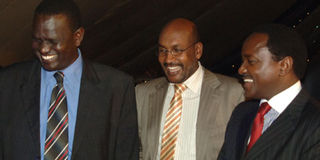Kenya to register cellphone users to curb crime

Vice President Kalonzo Musyoka (extreme right) shares a light moment with Northern Kenya and other arid lands minister Mohamed Elmi (centre) and Information minister Samuel Poghisio (left) during a gala dinner to commemorate the Communication Commission of Kenya (CCK) 10th anniversary and ICT Expo at the Carnivore on Monday. Photo/VPPS
What you need to know:
- President Kibaki directs Information and Communication ministry to ensure all mobile telephone subscribers are registered within six months.
- Increase in use of mobile phones to carry out criminal activities has led to decision.
Government was committed to ensuring that all Kenyans have access to ICT services.
The Kenya Government has moved to ensure that mobile phone subscribers are registered to curb crime.
The decision has been reached following the increase in use of phones to carry out criminal activities arising from the fact that most users are unregistered.
"To guard against these tendencies, I am directing the ministry of Information and Communication to put in place within six months from now, an elaborate databank that will ensure all mobile telephone subscribers are registered," said a presidential statement read by Vice President Kalonzo Musyoka.
Mr Musyoka was representing President Kibaki during a gala dinner to commemorate the Communications Commission of Kenya tenth anniversary at the Carnivore on Monday.
The activation and subsequent use of a mobile phone in Kenya is not controlled. Anyone can walk into a shop, buy a phone and start using it without having to register with any government agency.
Police spokesperson Eric Kiraithe has previously said it is this failure that criminals are taking advantage of to harass people.
“Crime management would be a lot easier if the cellphone users and their lines were open to the authorities,” he said.
“How the concept was introduced and managed did not factor in the security implications.”
In most other countries, every mobile phone is associated with an owner and his particulars must be held by mobile phone service providers.
Phone ownership
Subscriber Identity Module (SIM) cards are only enabled by the firms when details of the buyer are held. But the government has equally been blamed for failing to pass a law giving the police and other security agencies access to details of phone ownership or usage when investigating crime.
The President also said the government was committed to ensuring that all Kenyans have access to ICT services.
He said that the government will this year spend Sh1.3 billion in purchasing mobile computer laboratories for each constituency for use by secondary schools and another Sh15 billion to support the purchase of lap tops.
President Kibaki said such projects will ensure that youths in the rural areas were well equipped with key ICT skills to enable them participate effectively in the unfolding digital economy.
To redress the rural/urban divide in access to ICT services, the President said the government has amended the law to facilitate the creation of Universal Service Fund to finance the deployment of communication services in un-served areas of the country.
He said that in the 2009/10 financial year, the government has given numerous incentives to the ICT sub-sector by lowering taxes and giving rebates on key capital intensive investment areas and asked the industry to take advantage of the situation.
Key pillar
President Kibaki said the government has identified ICT as a key pillar of Vision 2030 where the Business Process Outsourcing sub-sector has been singled out as the next frontier of growth and employment creation for the youth.
“To ensure that this becomes a reality, the government has facilitated the construction of high speed international fibre optic infrastructure to connect the country to the international network,’’ he said.
President Kibaki further called for enhanced collaboration between the Government and the private sector in ensuring that the underserved areas which presented the next business frontier were reached.
Among those who addressed the function were Information and Communication minister Samuel Poghisio, CCK Director General Charles Njoroge, CCK chairman Engineer Philip Okundi and Information and Communication Permanent Secretary Dr Bitange Ndemo.
The minister for Northern Kenya and other Arid Areas Mohammed Ibrahim Elmi, Permanent Secretaries Samuel Kirui (Local Government) and Dr Ludeki Chweya (Home Affairs) were also present.




